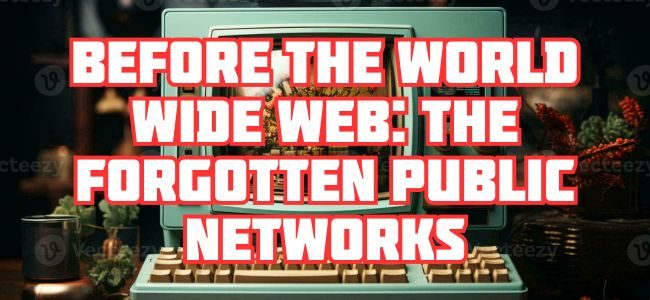Before the World Wide Web: A Nostalgic Look at the Forgotten Public Networks 🌐📟
Before the World Wide Web made clicking and scrolling an everyday activity, the internet was a more mysterious and hands-on experience. It wasn’t about websites, but about networks—grassroots, creative, and sometimes chaotic communities that laid the foundation for our modern online world. Grab your modem (and your patience), because we’re about to dial into the golden age of Fidonet, BBSes, and other legendary networks! 🎶📞
Fidonet: The First Social Network (Sort Of) 📬💾
Imagine a world without instant messages or 24/7 email access (gasp!). In this brave analog era, Fidonet was the MVP of long-distance communication. Born in 1984, Fidonet was a store-and-forward network, letting users send emails, share files, and participate in discussion boards.
How It Worked:
- You’d dial into a local bulletin board system (BBS), upload your message, and that BBS would forward it along a chain of other BBSes until it reached the recipient. Think of it as the digital version of passing notes in class—except the teacher (your phone bill) was watching. 📜💸
Fun Fact: Fidonet had “zones” (like international regions) to help organize messages globally. It was essentially the precursor to Reddit, but with a lot more patience and a lot fewer memes.
Bulletin Board Systems (BBSes): The Wild West of the Online World 🤠
Before websites, there were BBSes, where geeks and pioneers hung out to exchange messages, share files, and play text-based games. Each BBS was unique, reflecting the personality of its sysop (system operator).
How It Worked:
- You’d use your modem to dial directly into a BBS, one connection at a time.
- Inside, you’d find message boards, file libraries, and sometimes multi-user chatrooms (if the sysop was fancy).
The Drawbacks:
- Only one user could log in at a time unless the sysop had multiple phone lines. Imagine waiting in line for your favorite forum. ⏳
The Glory:
- Games like *Legend of the Red Dragon* (LoRD) were born here. Who knew slaying ASCII dragons could be so addictive? 🐉🎮
Usenet: The Internet’s Loud, Nerdy Uncle 📰🤓
Usenet, launched in 1980, was the first major global network for sharing information. It introduced newsgroups, where users could discuss everything from *Star Trek* to coding tips (and yes, plenty of heated arguments too).
How It Worked:
- Messages were categorized into newsgroups (e.g., ‘sci.tech‘, ‘rec.games‘, ‘alt.conspiracy‘) and distributed across servers globally.
- It was decentralized, meaning anyone with the right software could set up a Usenet server.
Fun Fact: Usenet invented flame wars and early internet humor. Think of it as the Twitter of its time — if Twitter required you to manually configure your connection and read posts line by line.
CompuServe and AOL: Where It All Got Corporate 💼📟
While Fidonet and BBSes were grassroots efforts, CompuServe and AOL brought the internet to the masses. These proprietary networks combined forums, chatrooms, and early email systems into polished packages.
CompuServe Highlights:
- Pioneered online forums, business services, and file sharing.
- Introduced the GIF format, so yes, they’re to blame for all those cat memes. 🐱🎉
AOL’s Claims to Fame:
- The iconic “You’ve Got Mail!” greeting that warmed (or haunted) millions of hearts.
- Endless free trial CDs, which you probably still have in a drawer somewhere.
Other Forgotten Gems 🚦
- The WELL: A small, exclusive network famous for intellectual discussions. Think of it as LinkedIn, but without recruiters bothering you.
- BITNET: A network for universities, connecting academics before the internet became mainstream.
- X.25 Networks: Early packet-switched networks used by governments and businesses for serious communication.
Why Do These Networks Still Matter? 🤔
These early networks weren’t just technological marvels — they were communities. They taught us how to:
- Communicate Digitally: Fidonet and BBSes introduced the concepts of emails, forums, and file sharing.
- Moderate Online Spaces: Sysops were the first moderators, laying the groundwork for today’s social media admins.
- Build for Connection: These networks connected people across the globe long before Facebook or Twitter existed.
Lessons from the Pre-Web Era 🌟
Today, we take the internet’s speed and convenience for granted. But the early pioneers who crafted these networks had one thing we often forget: patience. They waited hours for a single email to forward, celebrated every successful login, and built systems that were as creative as they were functional.
The next time you send an instant message or stream a video in seconds, give a little nod to the Fidonet nerds and BBS sysops who paved the way. Without them, we might still be passing notes—or worse, waiting in line for our turn to log in. 🙃
Happy hosting and happy reminiscing 📡✨

